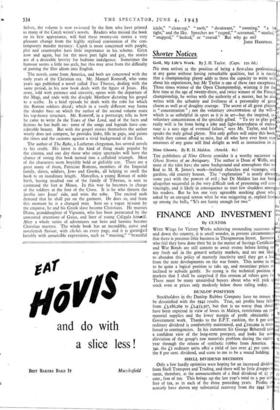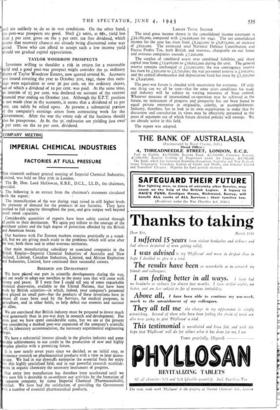FINANCE AND INVESTMENT . s ° 1
• By CUSTOS
Wrrn Wings for Victory Weeks achieving resounding successes u and down the country, it is small wonder, in present circumstances that there is precious little business in Throgmorton Street. Investor who feel they have done their bit in the matter of Savings Certificat and War Bonds are still content to await events before letting ou any fresh sail in the general security markets, and are not likel to abandon this policy of masterly inactivity until they get a lea from the next developments on the war fronts. This seems to m to be quite a logical position to take up, and meantime prices ar inclined to subside gently. So strong is the technical position markets that I shall be surprised if this erosion .of values goes fa There must be many unsatisfied buyers about who will pick u stock even at prices only modestly below those ruling today.
DUNLOP POSITION Stockholders in the Dunlop Rubber Company have no reason be dissatisfied with the 1942 results. True, net profits have fall from £3,186,269 to £2,433,307, but that is no worse than shoul have been expected in view of losses in Malaya, restrictions on ra material supplies and the lower margin of profit obtainable 0 Government work. Thanks to the E.P.T. cushion, the 8 per cen ordinary dividend is comfortably maintained, and Doo,000 is tran ferred to contingencies. In his statement Sir George Beharrell tak a confident view of the long-term prospect, and looks for so alleviation of the- group's raw materials problem during the curie year through the release of synthetic rubber from America. 34s. the La ordinary units offer a yield of just over 41 per cent. the 8 per cent. dividend, and seem to me to be a sound holding.
SHELL DIVIDEND DECISION
Only a few hardly optimists were hoping for an increased divide from Shell Transport and Trading, and there will be little disappom ment, therefore, at the announcement of a final dividend of 21- cent., free of tax. This brings up the last year's total to 5 per cen free of -tax, as in each of the three preceding years. Profits scarcely have shown any substantial recovery from the 1941 ley d are unlikely to do so in war conditions. On the other hand, e post-war prospects are good. Shell £i units, at 68s., yield less an 3 per cent. gross on the 5 per cent. tax free dividend, which cans that recovery chances are already being discounted some way ead. Those who can afford to accept such a low income yield ould see gradual capital appreciation.
TAYLOR WOODROW PROSPECTS Investors willing to shoulder a risk in return for a reasonable 'eld and a good post-war prospect might consider the 5s. ordinary ares of Taylor Woodrow Estates, now quoted around 8s. Accounts rust issued covering the year to October 31st, 1942, show that earn- gs were equivalent to over 36 per cent. on the ordinary shares, t of which a dividend of to per cent. was paid. At the same time, interim of 24 per cent. was declared on account of the current ancial year ending on October 31st. Although the E.P.T. position s not made clear in the accounts, it seems that a dividend of to per ent. can safely be relied upon. At present a substantial pardon the company's earnings arises from contracting work for the overnment. After the war the estate side of the business should lso be prosperous. At 8s. the 55: ordinaries are yielding just over per cent. on the to per cent. dividend.



























 Previous page
Previous page